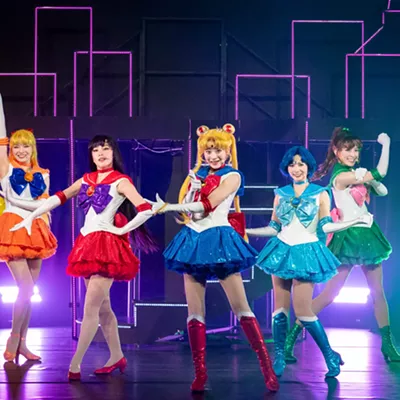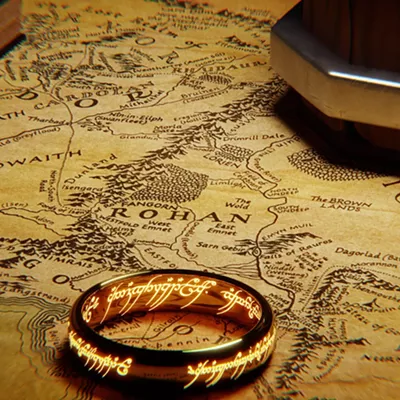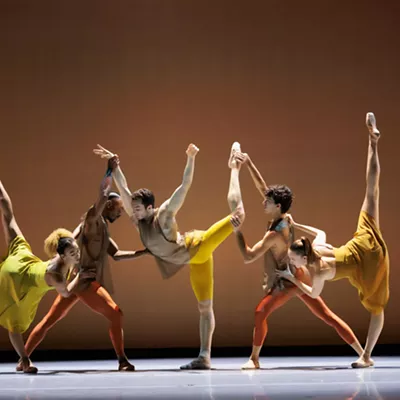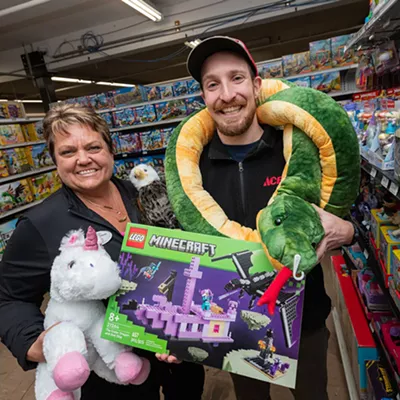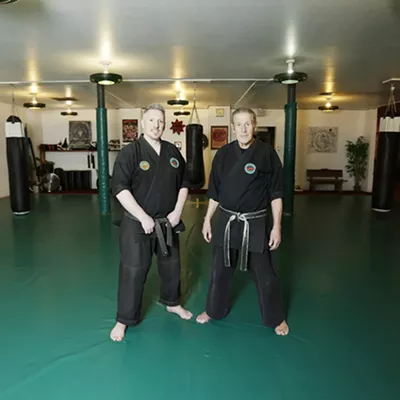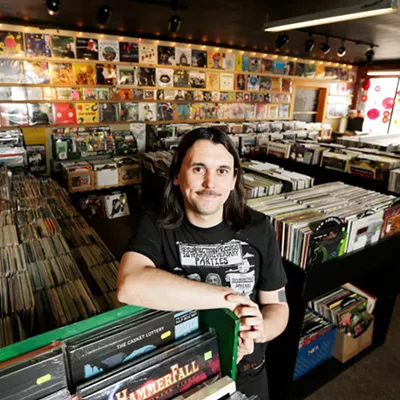Few cult musicals have earned that modifier — cult — as completely as The Rocky Horror Show. Ever since its stage premiere in 1973 as a campy, ribald sendup of early science fiction and horror B-movies, the show has become a magnet for die-hards who want to thrust their pelvises along with the "Time Warp" or shout insults at the straight-laced protagonists Brad and Janet.
Troy Nickerson and Heather McHenry-Kroetch don't really count themselves among those staunch fans.
"It was something I went to with theater kids in high school, at the Magic Lantern, of course — that kind of thing," says Nickerson. "But neither one of us was a huge Rocky groupie of any kind."
It might seem odd, then, that the two would unite to direct a new production of The Rocky Horror Show, which begins its three-week run at Stage Left this weekend. But when you consider that their past joint projects include Little Shop of Horrors and Evil Dead the Musical, maybe it's not all that unusual.
And more importantly, Nickerson says, the musical "was time that we could spend together" after the prolonged COVID hiatus.
"We've been friends for over 30 years, and we work really well together, but during COVID we didn't get to see each other that much. So it just seemed like a good fit for us. It was a really great, fun project to work on together," he says.
For McHenry-Kroetch, it also marked a creative change of pace. Her last directorial outing was for Murder on the Orient Express at the Spokane Civic Theatre this past spring. The Agatha Christie murder mystery was much more conventional than Rocky Horror's Transylvanian "transvestites" (an original, albeit now outdated, term used in the play and film) and lab-made specimens of manhood — although the play itself was also much newer.
"This show actually has more tradition behind it. Just [detective] Poirot has to be classic in Orient Express, right? Here, there's a lot of history that we're finding from everybody who's seen it so many times," she says.
"We're kind of learning about it from cast members as we go," adds Nickerson.
"They're a very youthful cast," McHenry-Kroetch says. "I think the audience is going to be pleasantly surprised, especially people who go to the theater a lot, because these are people they haven't seen over and over."
Stage Left Theater, 108 W. Third Ave.
Oct. 27-Nov. 13
Thu-Sat at 7 pm, Sun at 2 pm
Nov. 18 & 19
Fri-Sat at midnight
All showings are sold out
Among the young devotee cast is Gabriel A. Conesa Caquias, a relative newcomer to the local stage who's playing the roguishly androgynous mad scientist Frank-N-Furter. The character was first epitomized by a corset-bound Tim Curry in the original stage production as well as the 1975 film adaptation, The Rocky Horror Picture Show.
"I am 100 percent a fan," Caquias says. "I actually watched Rocky Horror the movie before I even got into theater. I didn't even know it was a play. I just fell in love with the show, and I would sing the songs and used to try to imitate [Curry's] walk."
Yet that doesn't mean that Caquias, who prefers the nonbinary pronoun they, is just aiming to mimic Curry's memorable turn as Frank.
"Obviously, I started theater because I want to tell beautiful stories. I want to make people feel things," they say. "And so the actor in me is like, yes, I want to make Frank my own. I want to showcase all the different sides of Frank. But as a really big fan, and knowing how this show affects everyone, I still owe at least a thank-you to Tim Curry as a tribute."
Caquias says their own take on Frank veers away slightly from the sinister and instead casts Frank more as a likable, "charismatic libertine" with a "freeing" effect on everyone around him.
Another inevitable departure from the film are the phantoms, an ensemble of singers who tend to be more prominent in stage versions of Rocky Horror. The co-directors have made them an integral part of the very fluid scene changes, something that Caquias sees as a unique highlight of this production.
"The phantoms are literally one of my favorite parts of the whole show. In many productions I've seen, the phantoms are there in the background but aren't used a lot. From the very beginning, Troy and Heather wanted them to be onstage. I think they watched musicals like Hamilton and Hadestown and saw how the ensemble was such a big part of the show, and they wanted to bring that to Rocky Horror," Caquias says.
"I won't spoil anything. I'll just say that we might be the sponge cake, but they're the icing. They make everything so f–ing good."
That's where Nickerson and McHenry-Kroetch say their lack of fandom has been an advantage.
"Because we didn't have all that attachment to it, we're coming from a place where we're looking at the text and going at it the same way that we would go at any production. So it's interesting. We're just approaching it like we would any other work we've done together," Nickerson says.
"We're keeping a nod to the traditions of the show," he continues, "and then still kind of making it our own and doing our own thing."
As part of that, afternoon and evening performances of Rocky Horror — the show's complete run is now sold out as of press time — allow costumes but won't encourage audience participation. Callouts will have to be reserved for the two midnight performances on Nov. 18 and 19. Both directors recognize that might leave some of the Rocky Horror disciples disappointed, but it's intended to keep the show accessible to everyone.
"I've been to productions where there were all the callouts and stuff, and sometimes there's so much of it that the actors can hardly get their lines out," Nickerson says. "That leaves the non-Rocky-die-hard people asking, 'What's the actual story?'"
"There is a story there," says McHenry-Kroetch. "And there's something about just enjoying the show for its story."
That story being one of orgiastic cross-dressing space aliens seducing a prudish young couple?
Nickerson laughs. "It's still about relationships!" ♦
E.J. Iannelli has been a contributing writer for the Inlander since 2010. Although he has covered everything from small business to steamboat history, his primary focus is on theater, literature and classical music. In 2022, he joined Spokane Public Radio, where he works as the arts and music director.





